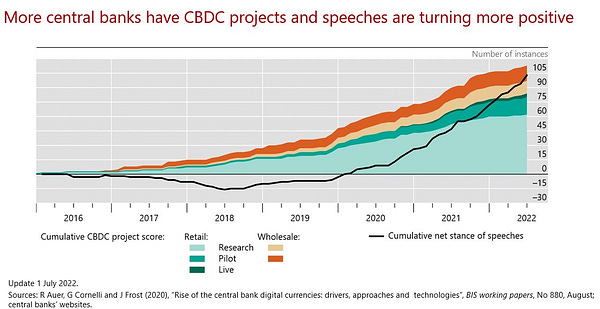Well, this piece was unexpected in many ways. While researching other leads on SARS-CoV-2, and writing my opinion piece, among life “stuff” a lot of things change within the last 72 hours. Enough to push me to write this one.
Since the inception of this Substack, I have covered the energy aspects of the current cascade of events, and have covered and paid attention since 2020.
The signs of an energy crunch have been out there for months, building up and any minor tipping point would send things into literal collapse. Russia cutting the flow of gas by a large margin was such a tipping point. Both my Energy Crunch posts will give you enough background information and analysis to understand this.
Germany's industry is basically on the verge of a literal collapse, which will lead the rest of the entire continent to one, via contagion.
Germany said Thursday it would raise the alert level under its emergency gas plan to secure supply following the recent reduction of pipeline supplies from Russia.
“Gas is now a scarce commodity in Germany,” Economy Minister Robert Habeck told reporters.
Triggering phase two brings Germany a step closer to the third and final stage that could see gas rationing in Europe’s top economy.
Russia was using gas “as a weapon” against Germany in retaliation for the West’s support for Ukraine following Moscow’s invasion, Habeck said.
Germany’s Union Head Warns of Collapse of Entire Industries
Top German industries could face collapse because of cuts in the supplies of Russian natural gas, the country’s top union official warned before crisis talks with Chancellor Olaf Scholz starting Monday.
“Because of the gas bottlenecks, entire industries are in danger of permanently collapsing: aluminum, glass, the chemical industry,” said Yasmin Fahimi, the head of the German Federation of Trade Unions (DGB), in an interview with the newspaper Bild am Sonntag. “Such a collapse would have massive consequences for the entire economy and jobs in Germany.”
Even the third-largest city in Bavaria, Augsburg wants to switch off traffic lights and other changes to curb energy consumption.
In Augsburg they have been calculating feverishly in the last few days. And the result was frightening for the city leaders: According to the current status, the annual costs for electricity, natural gas, district heating and other energy services would increase from around 15.9 million euros to around 28.3 million euros for the current year. "That corresponds to an increase of almost 80 percent!"
If you have been reading my Beyond Mathematical Odds series or following my Substack/Twitter for a while you won’t be surprised by this coming to be, but it will surprise many, as it did it myself, the speed which it came. Before I touch on course correction governments decided to do, I will keep delving into the energy aspect of the cascade. While the world faces a massive fuel crunch with most oil-producing and refining countries almost at maximum output, of course, China would choose to do the next move.
China Allows Refiners to Export 40% Less Fuel Than a Year Ago
Five million tons of quota awarded to refiners in latest batch
Beijing not interested in ramping up exports to meet demand
China issued its latest batch of fuel export quota for the year, but total allowances are still around 40% less than the same point in 2021.
Some 5 million tons of diesel, gasoline and jet fuel quotas were awarded, according to refinery executives who received preliminary notices from the Ministry of Commerce and a note from local consultant OilChem.
A short while ago, Macron publicly told Biden, surrounded by reporters, that Oil-producing countries could not meet demand because there were already close to maximum output, and self-preservation will dominate anyone when they are faced with the hardship of reality, and politicians are no different. Of course, China would exploit this. China is among the world's largest refiners in the world, so curbing exports while the entire system is strained will have an impact, maintaining fuel prices higher for longer.
Another fact to take into consideration, the lockdown in China that lasted over 8 weeks barely had measurable effects on the global fuel stocks, now that they are coming back online, demand will grow, so this is another reason why would they curb exports. China’s first transnational gas pipeline with Turkmenistan is now operation, while the rest of the world faces the harsh reality of massive gas prices when one of the biggest producers and exporters decided to shut it off.
With fuel prices at a ever-increasing cost for the global population, we get ourselves this.
Key South African Trade Route Blocked as Fuel Costs Surge
South Africa increased fuel prices to a record this week
Blockage is hurting chrome and coal exports via Maputo por
Protesters in a city in South Africa’s north east blocked roads including a key route linking the country to Mozambique with trucks Wednesday as they demonstrated against pump prices rising to a new record.
These protests at specific sectors have a severe impact on the overall global recovery outlook and can leverage the cascade into the wrong tipping side, cascading into progressive failure. Countries are importing coal from Africa at a larger pace than ever before, and this impact the global price of coal, already at historical levels in Europe (and will go ever higher in the short term).
Repeating myself, when countries are faced with such dynamics, they will revert to basic 18-century geopolitics and attempt to acquire any type of meaningful resource in uncertain times.
The Karakalpakstan autonomous region, in Uzbekistan is under a popular revolt, because the Uzkeb government wants to remove its autonomous status from it and integrate into the country. The region is rich in natural resources.
Ecuador has faced protests for the last 2 weeks because of food and fuel shortages and the inflating costs, which third-world countries can’t cope with as much as first-world countries can. Closed road is Mbombela (South Africa) over fuel prices.
Half of Vietnam’s fishing boats are stranded ashore due to rising fuel costs. Nigeria’s commercial capital Lagos has been bogged down with long fuel queues in recent weeks. The capital city Abuja has consistently seen traffic queues since February.
In Ethiopia, motorists in Addis Ababa, the country’s capital, were seen queuing for eight hours to access fuel, a situation that could deteriorate later in the month, according to a Bloomberg report.
In the UK, Driver staged a go-slow protest over the hike in fuel prices. According to BusinessDay checks, protesters snarled up major UK roads causing a prolonged traffic jam, to demand government action against rocketing fuel prices.
In Ghana, people are protesting, breaking out due to soaring prices of fuel, food and high cost of living, as inflation surges to 27 percent.
Thousands of people took to the streets of Maputo, Mozambique’s capital, on Monday to protest against the rise in fuel prices.
From several comments on Twitter with #Fuelprotest, from Spain to the Netherlands, people protest against the surge in fuel prices. Spanish farmers begin to block motorways, protesting against the fuel price increase. In Netherland, farmers and fishers protested, getting intense Army/Police sent to deal with protesters. The Dutch protested high fuel, gas, food shortage of fertilizers from Russia, and high inflation.
Source for the above.
There is more to the Netherlands story, but I won’t get to it here, you can go to my Twitter account and see some of it, it has to do with the WEF, I will comment about this in the next (opinion) piece.
Clear signs were this is all headed for the short term at least. Countries and governments will continue to face protests and demonstrations like this over the cost of fuel and food. The costs and loss of purchasing power are leading to many strikes around the world, I have covered but half a dozen here, and between those and this piece, many others came to be.
French rail strike, pilots in Denmark, Norway and Sweden are now on strike, mechanics will join them too. UK rail workers decided to go on strike too, Coal India (one of its biggest producers) is also on the verge of a mass strike for over $5 billion in salary increases and many other local strikes. As I wrote a while back as a forecast when the cost of misguided policies caught up with governments around the world, and they had to face the dance, they would find themselves between a rock, and a hard place, and this is part of it.
Many of these governments are choosing the shortsighted option to deal with this, by printing money and assuring the inflationary trend in the future. Which ironically enough aligns with this.


Now I want to remind you of this piece.
Since elites around the world are hellbent on green energy for whatever esoteric, misguided bullshit reason, members will pressure, and will achieve what common sense tells the ordinary man. Including nuclear and some forms of gas as green options, while they try to solve the resource and manufacturing mess.
Securing both is paramount for a real chance at going green in the next decade, and nuclear is the best option, followed by gas which is a very good cost-effective option, yet. You can find quite a few articles about how this craze about green energy investment, partially created the current oil conundrum too. Does your country want a green future ? Short-term oil investment will be needed.
Why am I citing something from 6 months ago ? Because of this.
EU parliament backs labelling gas and nuclear investments as green
Lawmakers back 'green' EU investment label for the fuels
Likely to become law unless super-majority of states veto
Gas, nuclear rules have split EU countries and lawmakers
Luxembourg, Austria to challenge law in court
As I forecasted, and anyone with some common sense could tell, and some of the better experts also stated it would be the only way out, the EU is pushing hard to label gas and nuclear as green. Not surprising and a lot later than the optimal time, alas self-preservation is one hell of a motivator.
This is a good sign that at least parts of the political class and elites are aware of the dynamics going on, and paying close attention to the situations in poorer countries, and how fast people go into full revolt. The short-term pain, inflationary trends, and levels of recession are almost inevitable, but at least this is a good sign that things might get more stable. Energy is the most important aspect of the function of a complex system.
Things might look dire, especially short-term, but long term the dynamics are looking somewhat better if this level of common sense keeps going on, which won’t be easy because the elites will keep opposing any modicum of common-sense decision.
One thing that I got slightly wrong was the Container Tsunami that would hit the US. Given numerous variables (the American economy, the fact that some of the biggest retailers overstocked, the continuous lockdown on China, and the disruptions the war brought, among others) there was no massive tsunami and clog of containerships in the American ports.
Because thousands of containers are piled up in Europe (which I got right), ships have massive delays to unload the cargo.
There’s a massive pile-up of car, furniture exports bound for U.S. and it’s spreading across European ports
Ikea furniture, auto parts, and automobiles are delayed at major European ports.
Labor slowdowns and strikes are crippling container trade at both German and Netherland ports.
The backlog of containers will take months to clear out.
Labor slowdowns and strikes at the German and Netherland ports are creating a massive pile-up of export containers bound for the U.S. that will take months to clear out.
According to the bills of lading found through ImportGenius, some of the items that are exported out of these ports are critical components to the auto sector like lithium batteries, fully assembled automobiles, as well as a wide variety of auto parts, and chassis. Mercedes, BMW, and Ford were listed in recent U.S. Customs filings.
“U.S. importers need to look four to five weeks in advance to see if there is a vessel available,” said Andreas Braun, Europe, Middle East, and Africa ocean product director of Crane Worldwide Logistics. “This is not normal. Also, if you are lucky to book a slot on a vessel you then have to locate an empty container which can be in the hinterland.”
Home decor, flooring, and furniture from Ikea were also listed.
“The congestion from these ports is spreading to other major ports in Europe,” Braun said.
Slowdowns in vessel arrival, container processing, and container availability as well as trucking are common problems.
“There is currently no end in sight to the congestion in container shipping,” said IfW’s Vincent Stamer, adding that traffic jams were also growing outside Chinese ports.
“For Germany and the EU, this affects overseas trade in particular, especially with Asia, where consumer electronics, furniture and textiles, for example, are shipped from.” via GCaptain
Different countries, back at similar dynamics, and now the backlog is enormous and it will take months to regularize if those pesky workers stop striking over their meager salaries and extensive work hours.
Thankfully the American spirit has a hold and cooler heads prevailed and my most feared strike of dockworkers in California and elsewhere in ports in the US, at an incredible number of 22.000 workers, didn’t come to pass for now.
The logistics world and the supply chain keep hitting snags after every sign of recover…
While shipping continues apace as the sides try to hammer out a new contract, a work stoppage would hit ports from California to Oregon and Washington State—ports that handle nearly 40 percent of all U.S. imports a time when supply chain issues are already exacerbating the nation’s highest inflation since about the fourth season of Taxi.
“While there will be no contract extension, cargo will keep moving, and normal operations will continue at the ports until an agreement can be reached,” read a joint statement from the Pacific Maritime Association and the International Longshore and Warehouse Union.
“Both sides understand the strategic importance of the ports to the local, regional and US economies, and are mindful of the need to finalize a new coast-wide contract as soon as possible to ensure continuing confidence in the West Coast,” the ILWU and PMA said.
In the end, short-term, nothing changed, countries will still experience blackouts, brownouts, rationing, and energy prices will keep going up and down, and rally like crazy, but the outlook long-term is better now.
Things can actually improve if we don’t let the elites fuck this up (more on this in the opinion piece).






Perhaps the most maddening part of all this is how "the people" are now revolting over gas prices and the cost of shopping - but were dumb, silent shitwits when it came to mandating experimental injections? They have stayed dumb and silent even as the 'conspiracy' theories proved correct again and again, as the obvious lack of effectiveness and the obvious harms mount up, continued silence and indifference, but hey, raise the cost of their shopping due to shortages and transport problems and suddenly they lose their minds and protest that someone somewhere DO SOMETHING?
God I hate my own species at times. Can't help feeling they deserve all this, good n hard. Fukwits.
How we got here: https://unlimitedhangout.com/2022/06/investigative-reports/the-revenge-of-the-malthusians-and-the-science-of-limits/